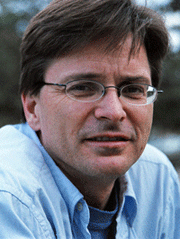“The old future’s gone,” John Gorka sings. “We can’t get to there from here.”[1]
That insight from Gorka,[2] one of my favorite singer/songwriters chronicling the complexity of our times, deserves serious reflection. Tonight I want to argue that the way in which we humans have long imagined the future must be rethought, as the scope and depth of the cascading crises we face become painfully clearer day by day.
Put simply: We’re in trouble, on all fronts, and the trouble is wider and deeper than most of us have been willing to acknowledge. We should struggle to build a road on which we can walk through those troubles -- if such a road is possible -- but I doubt it’s going to look like any path we had previously envisioned, nor is it likely to lead anywhere close to where most of us thought we were going.
Whatever our individual conception of the future, we all should re-evaluate the assumptions on which those conceptions have been based. This is a moment in which we should abandon any political certainties to which we may want to cling. Given humans’ failure to predict the place we find ourselves today, I don’t think that’s such a radical statement. As we stand at the edge of the end of the ability of the ecosystem in which we live to sustain human life as we know it, what kind of hubris would it take to make claims that we can know the future?
It takes the hubris of folks such as biologist Richard Dawkins, who once wrote that “our brains … are big enough to see into the future and plot long-term consequences.”[3] Such a statement is a reminder that human egos are typically larger than brains, which emphasizes the dramatic need for a drastic humility.
I read that essay by Dawkins after hearing the sentence quoted by Wes Jackson, an important contemporary scientist and philosopher working at The Land Institute. [4] Jackson’s work has most helped me recognize an obvious and important truth that is too often ignored: For all our cleverness, we human beings are far more ignorant than knowledgeable. Human accomplishments -- skyscrapers, the internet, the mapping of the human genome -- seduce us into believing the illusion that we can control a world that is complex beyond our ability to understand. Jackson suggests that we would be wise to recognize this and commit to “an ignorance-based worldview” that would anchor us in the intellectual humility we will need if we are to survive the often toxic effects of our own cleverness. [5]
Let’s review a few of the clever political and theological claims made about the future. Are there any folks here who accept the neoliberal claim that the triumph of so-called “free market” capitalism in electoral democracies is the “end of history”[6] and that there is left for us only tweaking that system to solve any remaining problems? Would anyone like to defend the idea that “scientific socialism” not only explains history but can lay out before us the blueprint for a glorious future? Would someone like to offer an explanation of how the pending return of the messiah is going to secure for believers first-class tickets to the New Jerusalem?
To reject these desperate attempts to secure the future is not to suggest there is no value in any aspect of these schools of thought, nor is my argument that there’s nothing possible for us to know or that the knowledge shouldn’t guide our action. Instead, I simply want to emphasize the limits of human intelligence and suggest that we be realistic. By realistic, all I mean is that we should avoid the instinct to make plans based on the world we wish existed and instead pay attention to the world that exists. Such realistic thinking demands that we get radical.
Next Page 1 | 2 | 3 | 4 | 5 | 6 | 7
(Note: You can view every article as one long page if you sign up as an Advocate Member, or higher).





